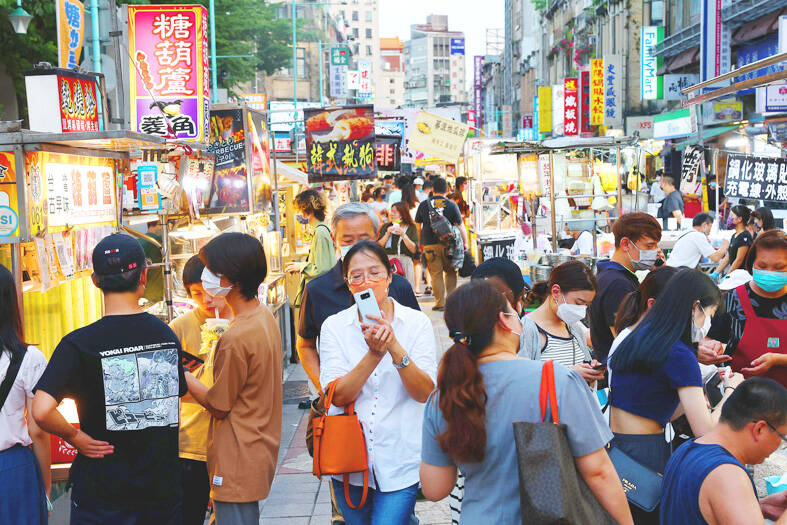Nearly 40 percent of potential tourists surveyed said they are interested in visiting Taiwan this year, with food cited as the biggest draw, a poll released on Monday by a travel-related news Web site showed.
The findings were part of a report that the Chinese-language Xinmedia, which is affiliated with Lion Travel Service Co (雄獅旅行社), presented during a global travel forum on trends related to travel to Taiwan this year.
Although the report referred to respondents generally as “international tourists,” most participants were Asian, with 33 percent from South Korea; 22 percent from Japan; 17 percent from China, Hong Kong and Macau; and 12 percent from Southeast Asia.

Photo: CNA
The survey showed that more than 50 percent of the respondents planned to travel to Taiwan within the next two years, while nearly 40 percent hoped to visit this year.
Regarding why they wanted to visit Taiwan, the top three reasons cited by respondents were Taiwan’s specialty foods (60.7 percent), natural scenery (43.9 percent) and safe environment (22.8 percent).
Among those interested in traveling to Taiwan, 38 percent said they would visit through custom tour packages, 35 percent said they would purchase one-day tours in Taiwan through online travel platforms and 27 percent said they would opt for group tours arranged by travel agencies.
Nearly 40 percent of the respondents said they were willing to spend more than US$1,000 on a trip to Taiwan and were willing to spend more for restaurants, accommodation and activities that offer localized experiences.
The survey also found that 50 percent of respondents who wanted to visit Taiwan would stay for three to five days, followed by 23 percent who would stay one to two days and 17 percent who would stay for five to seven days.
The top five tourist destinations cited in the survey were Taipei (74.2 percent) and Kaohsiung (32.8 percent), followed by New Taipei City, Tainan and Hualien County, the survey found.
The most popular travel experience cited was “night market shopping” (43.4 percent), followed by city tours and green tourism, while the most popular food was xiaolongbao, small steamed dumplings.
The choices of the relatively small number of European and American respondents differed significantly from those of Asian tourists.
They said they would prefer to spend seven to 10 days in Taiwan, with Taitung County and outlying islands given as the most popular tourist destinations, Xinmedia said in the report.
The survey was conducted between Jan. 3 and Feb. 9, with 3,011 valid questionnaires collected.

TAKING STOCK: A Taiwanese cookware firm in Vietnam urged customers to assess inventory or place orders early so shipments can reach the US while tariffs are paused Taiwanese businesses in Vietnam are exploring alternatives after the White House imposed a 46 percent import duty on Vietnamese goods, following US President Donald Trump’s announcement of “reciprocal” tariffs on the US’ trading partners. Lo Shih-liang (羅世良), chairman of Brico Industry Co (裕茂工業), a Taiwanese company that manufactures cast iron cookware and stove components in Vietnam, said that more than 40 percent of his business was tied to the US market, describing the constant US policy shifts as an emotional roller coaster. “I work during the day and stay up all night watching the news. I’ve been following US news until 3am

UNCERTAINTY: Innolux activated a stringent supply chain management mechanism, as it did during the COVID-19 pandemic, to ensure optimal inventory levels for customers Flat-panel display makers AUO Corp (友達) and Innolux Corp (群創) yesterday said that about 12 to 20 percent of their display business is at risk of potential US tariffs and that they would relocate production or shipment destinations to mitigate the levies’ effects. US tariffs would have a direct impact of US$200 million on AUO’s revenue, company chairman Paul Peng (彭雙浪) told reporters on the sidelines of the Touch Taiwan trade show in Taipei yesterday. That would make up about 12 percent of the company’s overall revenue. To cope with the tariff uncertainty, AUO plans to allocate its production to manufacturing facilities in

Six years ago, LVMH’s billionaire CEO Bernard Arnault and US President Donald Trump cut the blue ribbon on a factory in rural Texas that would make designer handbags for Louis Vuitton, one of the world’s best-known luxury brands. However, since the high-profile opening, the factory has faced a host of problems limiting production, 11 former Louis Vuitton employees said. The site has consistently ranked among the worst-performing for Louis Vuitton globally, “significantly” underperforming other facilities, said three former Louis Vuitton workers and a senior industry source, who cited internal rankings shared with staff. The plant’s problems — which have not

COLLABORATION: Given Taiwan’s key position in global supply chains, the US firm is discussing strategies with local partners and clients to deal with global uncertainties Advanced Micro Devices Inc (AMD) yesterday said it is meeting with local ecosystem partners, including Taiwan Semiconductor Manufacturing Co (TSMC, 台積電), to discuss strategies, including long-term manufacturing, to navigate uncertainties such as US tariffs, as Taiwan occupies an important position in global supply chains. AMD chief executive officer Lisa Su (蘇姿丰) told reporters that Taiwan is an important part of the chip designer’s ecosystem and she is discussing with partners and customers in Taiwan to forge strong collaborations on different areas during this critical period. AMD has just become the first artificial-intelligence (AI) server chip customer of TSMC to utilize its advanced